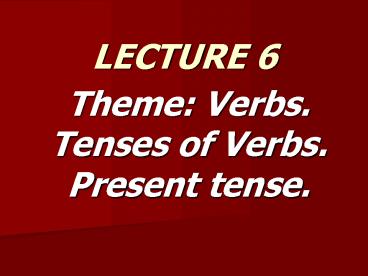Theme: Verbs. Tenses of Verbs. Present tense. - PowerPoint PPT Presentation
1 / 30
Title:
Theme: Verbs. Tenses of Verbs. Present tense.
Description:
LECTURE 6 Theme: Verbs. Tenses of Verbs. Present tense. Plan 1. Verb. 2. Tenses of Verbs. 3. Speaking practice. Tenses of Verbs Ukrainian verbs have only three basic ... – PowerPoint PPT presentation
Number of Views:952
Avg rating:3.0/5.0
Title: Theme: Verbs. Tenses of Verbs. Present tense.
1
LECTURE 6
- Theme Verbs. Tenses of Verbs. Present tense.
2
Plan
- 1. Verb.
- 2. Tenses of Verbs.
- 3. Speaking practice.
3
(No Transcript)
4
To study - ?????
5
To sit- ??????
6
To read- ??????
7
To shout - ???????
8
To speak - ????????
9
To buy - ????????
10
(No Transcript)
11
(No Transcript)
12
(No Transcript)
13
Tenses of Verbs
- Ukrainian verbs have only three basic tenses
present, past, and future.
14
(No Transcript)
15
Present tense
- Historically, this is derived from the
Indo-European present tense. In Common Slavic and
later Ukrainian, it retained its present meaning
only for imperfective verbs and developed a
future meaning for perfective verbs.
16
The present tense
- The present tense. Remember that it's only
imperfective verbs that can be in the present
tense.
17
Example 1 ??????? -- to have lunch
- ? ?????? I have/am having lunch
- ?? ??????? You have/are having lunch
(informal you) - ??? He
- ???? ?????? She has/is having
- ???? It
- ?? ???????? We have/are having lunch
- ?? ???????? You have/are having lunch
(formal and plural you) - ???? ???????? They have/are having lunch
18
- Two essential things to learn from this
example Ukrainian personal pronouns and six verb
endings to match six possible subject persons.
Note that English verbs in the simple present
tense do not change regardless of the subject
person except in third person singular
(I/you/we/they have, but he/she/it has).
19
Example 2 ?????? -- to write
- ? ???? I
write/am writing - ?? ????? You write/are writing
(informal you) - ??? He
- ???? ???? She writes/ is writing
- ???? It
- ?? ?????? We
write/are writing - ?? ?????? You
write/are writing (formal and plural you) - ???? ?????? They
write/are writing
20
- While the examples above may be considered to
belong to the same pattern (it is called
"Conjugation 1" in grammar books), conjugation 2
verbs have another vowel in their endings.
21
Example 3 ????? -- to learn/teach
- ? ??? I learn/am
learning - ?? ???? You learn/are learning (informal you)
- ??? He
- ???? ????? She learns/is learning
- ???? It
- ?? ????? We learn/are
learning - ?? ????? You learn/are
learning (formal and plural you) - ???? ????? They learn/are
learning
22
Example 4 ?????? -- to stand
- ? ???? I stand/am standing
- ?? ????? You stand/are standing (informal you)
- ??? He
- ???? ?????? She stands/is standing
- ???? It
- ?? ?????? We stand/are standing
- ?? ?????? You stand/are standing
(formal and plural you) - ???? ?????? They stand/are standing
23
Athematic verbs
- Ukrainian inherited from Indo-European through
Common Slavic, the following 3 athematic verbs.
These verbs have their own conjugation in the
present. Everywhere else they are regular.
24
- ???? - to give
- singular
plural - First Person ??? ????
- Second Person ???? ?????
- Third Person ????? ??????
25
???? - to eat
- Singular
plural - First Person ?? ???
- Second Person ??? ????
- Third Person ???? ?????
26
Compounds ending in -?????
- Singular
plural - First Person -??? -????
- Second Person -???? -?????
- Third Person -????? -??????
27
(No Transcript)
28
(No Transcript)
29
- ????? ?? ?????!
30
(No Transcript)

